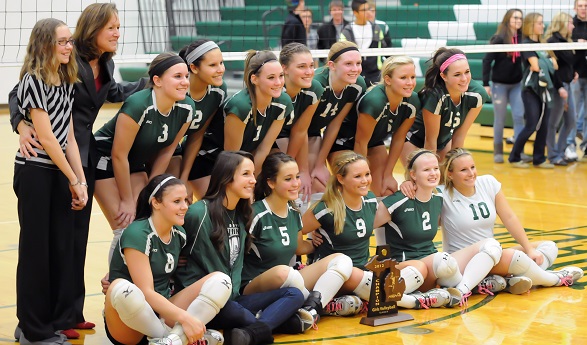
Wise Words for Coaches New (and Old)
September 13, 2013
By Geoff Kimmerly
Second Half editor
Every fall brings a new beginning for those who live by the high school calendar. And among those experiencing a new start are first-year high school coaches eager to begin their careers in educational athletics.
But what knowledge do they bring into their first coaching jobs? Most if not all played at the high school level, and many played at the college level as well. Some have served as assistants or coached youth teams. But high school coaching comes with its own set of challenges requiring an advanced set of skills – skills that are passed on annually as part of the Michigan High School Athletic Association’s Coaches Advancement Program.
To assist in giving some of our new coaches a running start, we tapped into the knowledge of three of our Coaches Advancement Program instructors for advice they give those just starting out:
 Jean LaClair began this fall 12th in MHSAA volleyball history with 861 wins since becoming a varsity head coach in 1987. She’s coached at Midland Dow, Pinconning and currently Bronson, where she’s also the athletic director and an assistant principal. She’s also served as an MHSAA official and contributed to the Women in Sports Leadership porgram.
Jean LaClair began this fall 12th in MHSAA volleyball history with 861 wins since becoming a varsity head coach in 1987. She’s coached at Midland Dow, Pinconning and currently Bronson, where she’s also the athletic director and an assistant principal. She’s also served as an MHSAA official and contributed to the Women in Sports Leadership porgram.
 Ken Semelsberger is a recent inductee into the Michigan High School Football Coaches Hall of Fame and spent 33 years at Port Huron High School as a coach and athletic administrator. He also coached football at Detroit Servite and has led teams in basketball, softball and baseball. Semelsberger returned to the Port Huron sideline four seasons ago as the varsity’s line coach.
Ken Semelsberger is a recent inductee into the Michigan High School Football Coaches Hall of Fame and spent 33 years at Port Huron High School as a coach and athletic administrator. He also coached football at Detroit Servite and has led teams in basketball, softball and baseball. Semelsberger returned to the Port Huron sideline four seasons ago as the varsity’s line coach.
 Penny Allen-Cook currently is an athletic consultant and in her fourth season coaching the Freeland varsity volleyball team. She also coached volleyball at Alma College, and is a former assistant commissioner of the Great Lakes Intercollegiate Athletic Conference. She served as an assistant athletic director at Alma College and director of compliance at Saginaw Valley State University.
Penny Allen-Cook currently is an athletic consultant and in her fourth season coaching the Freeland varsity volleyball team. She also coached volleyball at Alma College, and is a former assistant commissioner of the Great Lakes Intercollegiate Athletic Conference. She served as an assistant athletic director at Alma College and director of compliance at Saginaw Valley State University.
All were asked the following questions during separate interviews. But not surprisingly, some of their answers were similar – especially those that emphasized dealing with parental pressures and why they as coaches continue to return to the sideline every year.
Many of their answers also segued well into each other, so we’ve blended them for one longer conversation filled with wisdom beneficial to new and veteran coaches alike.
What do you tell those who are interested in becoming high school coaches?
Semelsberger: “Basically, it’s one of the most fulfilling things you’ll ever do. And it’s also one of the hardest things you’ll ever do. I try to explain that it’s not just about going to practice and coaching kids today. That’s the easy part. It’s also preparing for practice, (gaining) the knowledge of what to do in certain situations from the game itself all the way to training procedures, injury procedures and liability issues. That’s all part of the coaching realm.”
LaClair: “My biggest concern with young coaches is them getting driven out by parents really early. You’ve got to have thick skin, and you’ve got to have great relationships with parents. You can’t be afraid to talk to parents.”
Allen-Cook: “Certainly to coach is an extremely rewarding thing to do. But you can’t get into it for the money. You get into it for the things that last for a lifetime. My first year I started coaching was back in 1986, and I’ve kept in touch with those kids. (Coaching) can’t be for money or wins and losses, but the differences you make in lives.”
Semelsberger: “Probably not until after the first year do you realize all that’s entailed in coaching. (Coaches) say, ‘Once I really got into and do it, after the first time, it was a lot more than I thought.’ They say, 'What can you tell me to help me?'”
How do you encourage coaches who have become frustrated with the profession?
Allen-Cook: “It’s easier to get discouraged nowadays more than it used to be, and a common thing that discourages is the parent involvement is at a different level than it ever was 20 years ago. The key is to remember, and it’s hard for young coaches who aren't parents, but you tell them to step back and imagine what it feels like if you were the parent.”
LaClair: “I do try to get all young coaches a mentor, someone to talk with. We all get frustrated; we all have to vent, and we need the right person to talk it through with and come up with alternative ways (of dealing with situations).”
Semelsberger: “The one thing I tell them is to remember that what’s most important out there is how they influence athletes. I want to see them doing positive things with our athletes, stressing grades and sportsmanship. I hired a hockey coach once, and I told him to clean up the program. I don’t care if you win; I want our grades to be good, community involvement, and the wins and losses will come. If you stay with it, hang in there, it will come.”
Allen-Cook: “If they approach things the right way, in as few years as four or five, if they stick it out, they’ll learn the positives outweigh the negatives. I’m always encouraging them to stick it out a few more years until they can figure out their true philosophy, why they want to coach.”
What specific situations do you tell new coaches to prepare for, and how?
LaClair: “For me as a coach, the parent/athlete meeting is mandatory. If a parent comes to me with a question during the year, I say, ‘Do you remember the parent/athlete meeting? We discussed that.’ It sets the tone and tells parents how proactive you are as a person, how organized and prepared you are.”
Semelsberger: “When you’re not coaching, when you’re sitting in the stands, the parents are friendly. But once you’re on the sideline, now you’re the coach, and that changes the dynamic of the relationship dramatically. I explain to (coaches) that my philosophy is I’m dealing with parents’ most precious item. You want to treat each one of those children like you’d want your kids to be treated. You don’t have to play everyone all the time, but treat (athletes) with respect, talk to them and let them know what’s going on, why a kid isn't playing, so the kid has an idea what’s going on.”
Allen-Cook: “One of the best defenses is to be a student of whatever the game is they’re coaching so they can be seen as an expert all the time. Show it by going to clinics, reading up on things, and coming to practice with a true plan of what you’re doing every day. Parents are less likely to question if you know what you’re doing and they can see you’re a true student of the game and come every day prepared.”
LaClair: “Time management is critical. Especially for me, you need to have good practice plans, well thought out in advance so kids aren't standing around at all.”
Semelsberger: “Sometimes I tell (coaches) about reporters if the sport has a lot of reporters; always be positive, don’t be negative. ... (Also) I make sure they understand and follow the rules. Academics are the most important thing, so make sure every kid is eligible. And I tell them the most important people are secretaries and custodians. Get them on your side, and they’ll do anything for you.”
What advice do you offer coaches who also are balancing teaching or other jobs at the school?
LaClair: “Just over half of my (teachers are coaches), and that’s great. You can build a different type of relationship.”
Semelsberger: “Their number one job is being a teacher, and that’s always been the number one job. They can’t let the fact they coach take away from that. Classes are number one, and coaching comes after that.”
LaClair: “You have to think days and weeks ahead. I tell coaches who are also teachers that the weekends and a lot of Sundays are going to be for making lesson plans for the week, practice plans for the week. Then all they have to do is tweak them. Have a good plan and all you have to do is tweak, and you don’t have to do that for two hours on a Thursday night.”
Allen-Cook: “It’s a neat experience to be able to teach in other realms (like athletics). Unfortunately there are less and less teacher coaches.”
What keeps you coming back to coaching?
LaClair: “The kids. A lot of people think social media is an evil beast, and it can be. But what I love about it is I've been coaching a long time and I can keep up with former athletes all over the country, see baby pictures, things I wouldn't be able to do without social media.”
Allen-Cook: “I think once you’re a coach, you’re always a coach. It’s tough to get out of your blood. I enjoy the interaction with the young people. I’m an independent contractor now (Allen-Cook also has taught) so I have little interaction with student athletes anymore. It feels rewarding that in some way I’m having a positive impact.”
Semelsberger: “The kids, the athletes, just to watch them develop as human beings. We work hard with on our athletes being leaders in the (school) building; the first day of school our senior and junior football players were helping out the freshmen. If a kid was scared or something, trying to get where they needed to go, we had jerseys on and they knew if they saw a kid with a jersey on they could ask for help. To see those kids take on those roles ... I love watching the ninth graders come in as scared little kids and watch them leave as confident seniors going on to college or work or whatever they’ll do.”
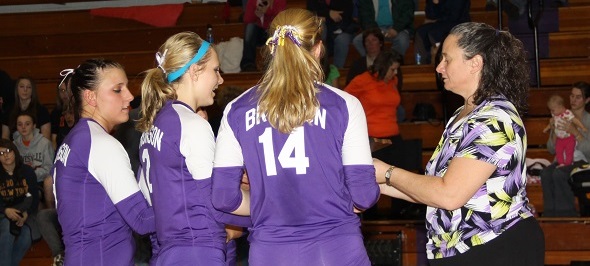
PHOTOS: (Top) Penny Allen-Cook (second from left, back row) and her Freeland volleyball team celebrate last season's Class B District championship. (Click to see more from High School Sports Scene.) (Below) Bronson volleyball coach Jean LaClair speaks with some her players during one of her more than 1,000 games as a varsity head coach. (Photo courtesy of the Sturgis Journal.)
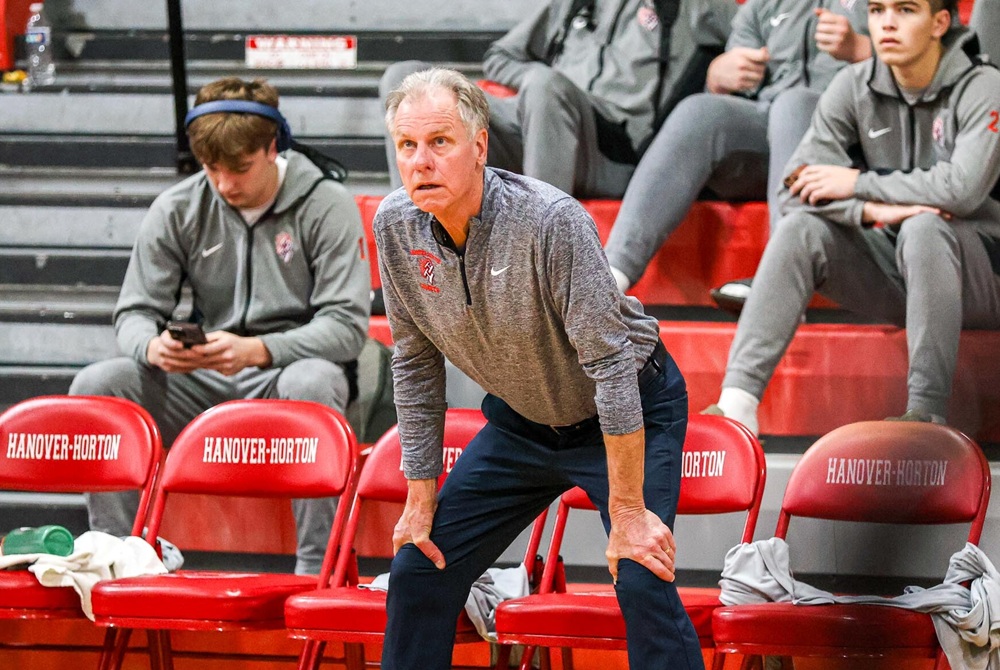
200 Wins Later, Lusk's 'Yes' Still Paying Off as Hanover-Horton Surges
By
Doug Donnelly
Special for MHSAA.com
February 3, 2026
Joe Lusk has had to be talked into coaching a couple of times.
But that hasn’t stopped him from being a winner.
 The Hanover-Horton girls basketball coach picked up career victory No. 200 last week when the Comets improved to 12-1 with a victory over Homer. It’s the best start to the season for Hanover-Horton since girls basketball transitioned from a fall sport to winter two decades ago.
The Hanover-Horton girls basketball coach picked up career victory No. 200 last week when the Comets improved to 12-1 with a victory over Homer. It’s the best start to the season for Hanover-Horton since girls basketball transitioned from a fall sport to winter two decades ago.
“He holds his girls accountable and wants to get the best out of each and every one of them,” said Comets athletic director Chris VanEpps. “We are very lucky to have him here at Hanover-Horton.”
Lusk’s career spans two Cascades Conference schools – his alma mater Michigan Center, and Hanover-Horton for the past five seasons. He was also on the bench at Michigan Center when the Cardinals enjoyed incredible success under coach Scott Furman.
Lusk’s story isn’t the typical one about a high school athlete growing up wanting to be a coach. The Consumers Energy retiree, in fact, never considered coaching basketball until his daughter Courtney came home one day and told him he was coaching her team.
“She was in the fifth grade,” Joe Lusk said. “She told me there was a tournament at Vandercook Lake, she was playing and I was going to coach. I told her no way.”
That no slowly turned into a yes.
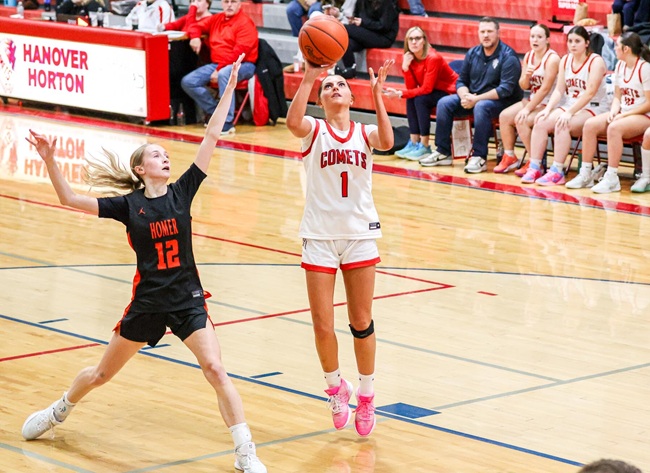 After coaching the youth basketball team for several years, Lusk was asked by Furman to join his varsity staff.
After coaching the youth basketball team for several years, Lusk was asked by Furman to join his varsity staff.
“He probably asked me 20 times,” Lusk said. “I kept telling him no. Ten years later, I was still coaching.”
Courtney grew into a varsity player and Lusk became an assistant coach.
“The joke at our house was she was either going to be a good basketball player or she was going to be in therapy,” Lusk said. “She would come home after a tough game and say, ‘Is tonight a therapy night?’”
Not much therapy was needed. The Cardinals went through a remarkable run during which they reached the MHSAA Finals twice and Semifinals another season before Courtney graduated in 2006.
Joe Lusk remained an assistant but, in 2012, Furman died, shocking the Michigan Center community. The ultra-successful coach had won more than 350 games during his career. Lusk took over the job, although he had reservations about becoming head coach.
Over the next nine seasons those reservations were put to rest as the Cardinals won 149 games. In 2018, they went 23-3 and made a run to the Division 3 Semifinals.
Lusk’s last season at Michigan Center was 2020-21. In June 2021, he was hired at Hanover-Horton.
“They found out there was an opening at Hanover and my wife (Cindy) and Courtney put together my resume and sent it in,” Lusk said. “They told me they were doing it. They wouldn’t let me quit (coaching).”
He was hired.
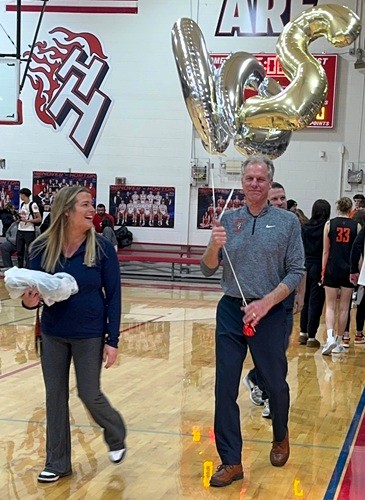 “Having an experienced coach like Coach Lusk is very important for our program,” VanEpps said. “His consistency and effort to make things better, not just for his teams, but for Hanover-Horton in general, give our younger staff someone to model themselves after. As for the girls on his team, he is stern but fair, which is something that can be lost on our younger generations.”
“Having an experienced coach like Coach Lusk is very important for our program,” VanEpps said. “His consistency and effort to make things better, not just for his teams, but for Hanover-Horton in general, give our younger staff someone to model themselves after. As for the girls on his team, he is stern but fair, which is something that can be lost on our younger generations.”
As for his current team being 12-1, Lusk knows the Comets have difficult games coming up. The Comets face Michigan Center (12-2) on Wednesday, Brooklyn Columbia Central (9-2) in a Cascades Conference West game in two weeks and state-ranked Concord in a nonconference matchup. Hanover-Horton also is in a District with powerhouses like Jackson Lumen Christi and Grass Lake. If the Comets win the Cascades West, they will likely face Grass Lake in the conference title game.
“We know the second half of our schedule is loaded,” he said.
Through it all, basketball remains a family sport. Courtney is the Comets’ junior varsity coach. Cindy keeps the scorebook for every game, something she has done for years.
“We are a basketball family,” Lusk said. “If Cindy didn’t do what she does, I wouldn’t be here today. She does a lot of work. For our juniors program, she keeps track of everything, all of the kids, what their shirt sizes are. If I had to do all of that, I wouldn’t be doing it. She loves basketball.”
 Doug Donnelly has served as a news and sports reporter at the Adrian Daily Telegram and the Monroe News for 30 years, including 10 years as city editor in Monroe. He's written a book on high school basketball in Monroe County and compiles record books for various schools in southeast Michigan. He is now publisher and editor of The Blissfield Advance, a weekly newspaper. E-mail him at [email protected] with story ideas for Jackson, Washtenaw, Hillsdale, Lenawee and Monroe counties.
Doug Donnelly has served as a news and sports reporter at the Adrian Daily Telegram and the Monroe News for 30 years, including 10 years as city editor in Monroe. He's written a book on high school basketball in Monroe County and compiles record books for various schools in southeast Michigan. He is now publisher and editor of The Blissfield Advance, a weekly newspaper. E-mail him at [email protected] with story ideas for Jackson, Washtenaw, Hillsdale, Lenawee and Monroe counties.
PHOTOS (Top) Hanover-Horton girls basketball coach Joe Lusk monitors the action during a game this season. (Middle) Lila Hamisfar (1) puts up a shot against Homer. (Below) Lusk carries balloons celebrating his 200th win alongside Hanover-Horton teacher and basketball parent Courtney Toteff. (Top and middle photos by Hannah Tacy/JTV. Below photo courtesy of Cindy Lusk.)

